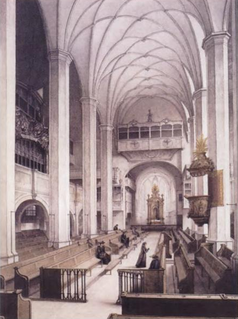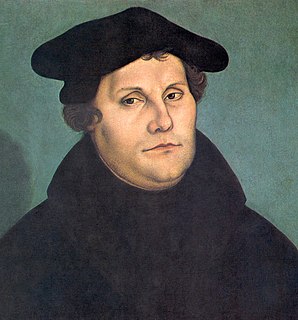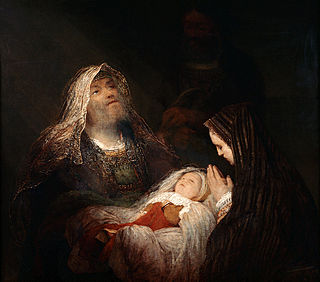Related Research Articles

Masaaki Suzuki is a Japanese organist, harpsichordist and conductor, and the founder and musical director of the Bach Collegium Japan. With this ensemble he is recording the complete choral works of Johann Sebastian Bach for the Swedish label BIS Records, for which he is also recording Bach's concertos, orchestral suites, and solo works for harpsichord and organ. He is also an artist-in-residence at Yale University and the principal guest conductor of its Schola Cantorum, and has conducted orchestras and choruses around the world.

Herr Gott, dich loben wir, BWV 16, is a church cantata for New Year's Day by Johann Sebastian Bach. It was first performed on 1 January 1726 in Leipzig, as part of the composer's third cantata cycle. Its libretto is by Georg Christian Lehms, opening with the beginning of "Herr Gott, dich loben wir", Luther's German Te Deum. The cantata's text was completed with a stanza from Paul Eber's "Helft mir Gotts Güte preisen" for the closing chorale.

Johann Sebastian Bach composed the church cantata Es ist nichts Gesundes an meinem Leibe, BWV 25 in Leipzig for the 14th Sunday after Trinity and first performed it on 29 August 1723.

Es erhub sich ein Streit, BWV 19, is a church cantata by Johann Sebastian Bach. He composed it in Leipzig in 1726 for the Feast of Saint Michael and first performed it on 29 September 1726. It is the second of his three extant cantatas for this feast.

Jesus schläft, was soll ich hoffen?, BWV 81, is a church cantata by Johann Sebastian Bach. He composed it in 1724 in Leipzig for the fourth Sunday after Epiphany and first performed it on 30 January 1724.

Johann Sebastian Bach composed the church cantata Nun komm, der Heiden Heiland, BWV 62, in Leipzig for the first Sunday in Advent and first performed it on 3 December 1724. The chorale cantata is based on Martin Luther's Advent hymn "Nun komm, der Heiden Heiland". It is part of his chorale cantata cycle.

Erfreute Zeit im neuen Bunde, BWV 83, is a church cantata by Johann Sebastian Bach. He wrote it in 1724 in Leipzig for the feast Mariae Reinigung (Purification) and first performed it on 2 February 1724.

Du Hirte Israel, höre, BWV 104, is a church cantata by Johann Sebastian Bach. He composed it for the second Sunday after Easter in Leipzig and first performed it on 23 April 1724.

Christen, ätzet diesen Tag, BWV 63, is a church cantata by Johann Sebastian Bach. He composed the Christmas cantata for the First Day of Christmas, possibly in 1713 for the Liebfrauenkirche in Halle. He performed it again for his first Christmas as Thomaskantor in Leipzig, on 25 December 1723.

Christum wir sollen loben schon, BWV 121, is a church cantata by Johann Sebastian Bach. He composed this Christmas cantata in Leipzig in 1724 for the second day of Christmas and first performed it on 26 December 1724. The chorale cantata is based on the hymn by Martin Luther "Christum wir sollen loben schon".

Johann Sebastian Bach composed the church cantata Herr Jesu Christ, du höchstes Gut, BWV 113 in Leipzig for the eleventh Sunday after Trinity and first performed it on 20 August 1724. The chorale cantata is based on the hymn "Herr Jesu Christ, du höchstes Gut" by Bartholomäus Ringwaldt (1588).

Johann Sebastian Bach composed the church cantata Was Gott tut, das ist wohlgetan, BWV 99, in Leipzig for the 15th Sunday after Trinity and first performed it on 17 September 1724. The chorale cantata is based on the hymn "Was Gott tut, das ist wohlgetan" by Samuel Rodigast (1674).

Liebster Immanuel, Herzog der Frommen, BWV 123, is a church cantata by Johann Sebastian Bach. He composed the chorale cantata in Leipzig for Epiphany and first performed it on 6 January 1725. It is based on the hymn by Ahasverus Fritsch (1679).

Ich liebe den Höchsten von ganzem Gemüte, BWV 174, is a church cantata by Johann Sebastian Bach. Bach composed the cantata in Leipzig for the second day of Pentecost and first performed it on 6 June 1729.

Süßer Trost, mein Jesus kömmt, BWV 151, is a church cantata by Johann Sebastian Bach. He composed it in Leipzig for the third day of Christmas and first performed it on 27 December 1725.
Ich steh mit einem Fuß im Grabe, BWV 156, is a church cantata by Johann Sebastian Bach. He composed it in Leipzig for the third Sunday after Epiphany and first performed it on 23 January 1729. The cantata is well known for its opening sinfonia for orchestra and oboe solo.

Tritt auf die Glaubensbahn, BWV 152, is a church cantata by Johann Sebastian Bach. He composed this dialogue cantata in Weimar for the Sunday after Christmas and first performed it on 30 December 1714.

Nun danket alle Gott, BWV 192, is a church cantata for Trinity Sunday composed by Johann Sebastian Bach in Leipzig in 1730. It is an incomplete cantata, because its tenor part is missing. It is a chorale cantata, setting the unmodified three stanzas of Martin Rinckart's "Nun danket alle Gott". It has been regarded as an expansion of Bach's chorale cantata cycle.
Dem Gerechten muß das Licht, BWV 195, is a church cantata by Johann Sebastian Bach for a wedding. He composed it in Leipzig, possibly in 1727, but only the incomplete scores of later performances from the 1740s survived. It uses two verses from Psalm 97 for the opening movement, and the first stanza auf Paul Gerhardt's hymn "Nun danket all und bringet Ehr" for the closing chorale. The librettist of the other movements is unknown.

J. S. Bach - Das Kantatenwerk is a classical music recording project initiated by the record label of Telefunken in 1971 to record all 193 sacred Bach cantatas. The project was entrusted to Nikolaus Harnoncourt and Gustav Leonhardt. Each conductor had his own instrumental ensemble, based in Austria and the Netherlands respectively.
References
- ↑ "Netherlands Bach Collegium". Bach Cantatas. Retrieved 29 December 2011.
- ↑ The Penguin guide to compact discs. Penguin Books. 2002. Retrieved 29 December 2011.
| | This article on a classical orchestra is a stub. You can help Wikipedia by expanding it. |